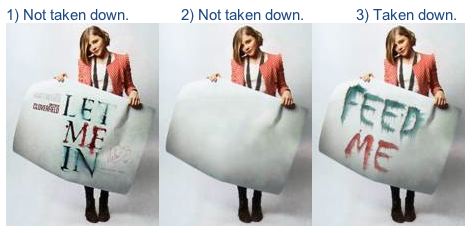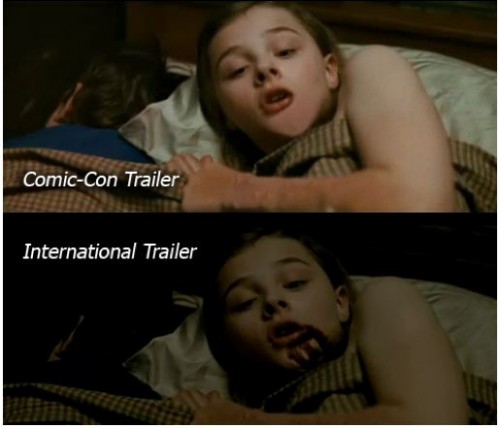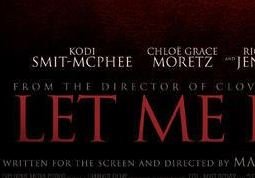The Facebook, the DMCA and the Problem with Counternotices
 Chunlou Yung is a very big fan of the Swedish horror film “Let the Right One In”, a movie about a child vampire. When he found out that the movie was receiving an American remake, entitled “Let Me In” he wanted to show his support and help promote the film.
Chunlou Yung is a very big fan of the Swedish horror film “Let the Right One In”, a movie about a child vampire. When he found out that the movie was receiving an American remake, entitled “Let Me In” he wanted to show his support and help promote the film.
He did what many others in the modern, social-media driven world do, he created a Facebook group to help generate some buzz, collecting information and works from various fan sites and official releases to share with others.
However, a marketing group working for Overture films, Mammoth Advertising, filed a DMCA takedown notice against the group, claiming that it was violating their copyright by posting “video clips, stills, photos and movie posters owned by Overture that have not been approved for upload to Facebook.” According to the complaint, the group had ripped content from various exclusive promotions and from the official Facebook group and uploaded them to their group.
Facebook complied and removed a great deal of content from the group. Yung responded on September 10 with a DMCA counter-notice, roughly the same day the notice was filed.
However, as of October 8, the content was still offline. Though the DMCA requires the host to wait 10 working days before restoring the content to allow the filer time to file suit or seek out a court order, nearly double the allotted time had passed. It wasn’t until media attention, including articles on Techdirt and Crunchgear, did the content get restored.
But by then the issue was largely moot. Yung had already closed his group and the film, despite getting good reviews, had largely bombed in the U.S. All that’s left now is an interesting case study DMCA takedowns, counternotices and fan communities.
Problems With the Notice
It is impossible for me to say with any certainty how valid or invalid the notice was. It involved many items in the group with a variety of uses and potential standings. Therefore, I’m going to largely avoid the issue regarding the validity of the notice and the counternotice.
However, to be clear, Yung did admit that it is “highly possible” that at least some of the content was exclusive and leaked to the Web without authorization. He went on to say that “It is completely legitimate for the rightful owner to take them down.”
Still, the use of the DMCA here was clearly misguided. Yung said he would have gladly worked with the marketing firm or Overture films to keep exclusive content off their site. As a fan of the film trying to promote it, simply racing to takedown infringing works via the DMCA was a pretty bad approach and does nothing to help the movie make money.
To make matters worse, according to Yung, the takedown was inconsistent. The difference between what was and was not taken down was almost cryptic. For example, this image:

The first image is the official poster, the second is a blank version edited by Yung and the third is a parody poster he created for the group. Strangely, the first two were allowed to stay while the third was removed, despite it likely having the strongest fair use arguments.
This inconsistency took place through the entire takedown with some marketing materials being removed, such as posters and official trailers, several parody images where they took stills from one of the two movies and wrote on them and at least one comparison image designed to show differences between the trailer for the U.S. and the Swedish movie the red band and the green band trailer for the film (Corrected by Yung).

In short, whether the notice or counternotice was valid for all the works there were at least some takedowns that were questionable and the decision to go this route against a fan community was foolish.
However, the case actually exposed a serious problem with the counter-notice system, namely that there is nothing to force hosts to put back content that was taken down after a DMCA notice has been filed.
What Happens After a Counternotice
The way the DMCA is supposed to work is that a copyright holder can file a takedown notice and have the works they believe to be infringing removed. If the uploader of the content disagrees that the works are infringing, either disputing ownership or believing their use to be a fair one, they can file a counternotice and, after a 10-14 day waiting period, have the work restored.
But, when it was clear that Facebook was not restoring the work in question promptly, Yung wrote me to see what, if anything he could do to force their hand.
The only answer I had was nothing, at least not under the law.
Though media pressure prompted Facebook to correct the mistake, if Facebook had not wanted to restore the content, there wasn’t much Yung could have done to force them.
The reason is that Facebook, as do nearly all hosts, has the right to refuse to host anything they don’t want on their servers. Facebook puts this in their terms of service saying that:
If you violate the letter or spirit of this Statement, or otherwise create risk or possible legal exposure for us, we can stop providing all or part of Facebook to you.
In short, all Facebook would have had to do is find some way in which Yung had violated the letter or the spirit of the terms of service and they could have denied him the right to post the works. All they would have been obligated to do is contact him and let him know of their decision.
YouTube, for example, takes this even farther saying that, after a counter-notice:
the removed Content may be replaced, or access to it restored, in 10 to 14 business days or more after receipt of the counter-notice, at YouTube’s sole discretion.
This means that you can file a counter-notice but YouTube can choose whether or not to actually restore the works, no reason need be given.
Finally, Myspace takes it yet another step farther saying that it:
reserves the right, in its sole discretion, to reject, refuse to post or remove any posting (including, without limitation, private messages, emails and instant messages (collectively, “messages”)) by you, or to deny, restrict, suspend, or terminate your access to all or any part of the MySpace Services at any time, for any or no reason
What all of this means is that you filing a counternotice does not by any stretch guarantee that the work will be restored and, since you agreed to these terms, you have no legal lever to force the host to restore it.
It appears that, short of media attention, there is little means of ensuring a counternotice is complied with, no matter how legitimate it may be.
Bottom Line
The notice and takedown system only works if it is handled with balance and fairness. It would make sense that, if copyright holders have a legal lever to secure the removal of allegedly infringing material (namely through the threat of liability if they fail to) then it would seem logical that users should have a similar tool to secure its replacement if the notice is invalid.
However, not only does the law not allow for that, it simply allows the host to keep their safe harbor if they do restore it, but the current status of terms of services with hosts make it almost impossible as users wave just about every right imaginable when they sign up for any host or service.
How can we ensure hosts restore content after a counternotice when we have no means to ensure they keep up content that hasn’t been subjected to a copyright complaint? There isn’t much one can hope to do.
After all, if Myspace can remove your content “for any or no reason” then there isn’t much of a means to force them to put works back after a DMCA notice.
This highlights a weakness in the DMCA process and, perhaps more importantly, just how unbalanced the terms of service we agree to every day, usually without reading, really can be.
Want to Reuse or Republish this Content?
If you want to feature this article in your site, classroom or elsewhere, just let us know! We usually grant permission within 24 hours.
